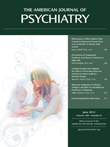Antidepressants May Mitigate the Effects of Prenatal Maternal Anxiety on Infant Auditory Sensory Gating
Abstract
Objective:
Prenatal maternal anxiety has detrimental effects on the offspring's neurocognitive development, including impaired attentional function. Antidepressants are commonly used during pregnancy, yet their impact on offspring attention and their interaction with maternal anxiety has not been assessed. The authors used P50 auditory sensory gating, a putative marker of early attentional processes measurable in young infants, to assess the impact of maternal anxiety and antidepressant use.
Method:
A total of 242 mother-infant dyads were classified relative to maternal history of anxiety and maternal prenatal antidepressant use. Infant P50 auditory sensory gating was recorded during active sleep at a mean age of 76 days (SD=38).
Results:
In the absence of prenatal antidepressant exposure, infants whose mothers had a history of anxiety diagnoses had diminished P50 sensory gating. Prenatal antidepressant exposure mitigated the effect of anxiety. The effect of maternal anxiety was limited to amplitude of response to the second stimulus, while antidepressant exposure had an impact on the amplitude of response to both the first and second stimulus.
Conclusions:
Maternal anxiety disorders are associated with less inhibition during infant sensory gating, a performance deficit mitigated by prenatal antidepressant exposure. This effect may be important in considering the risks and benefits of antidepressant use during pregnancy. Cholinergic mechanisms are hypothesized for both anxiety and antidepressant effects, although the cholinergic receptors involved are likely different for anxiety and antidepressant effects.



